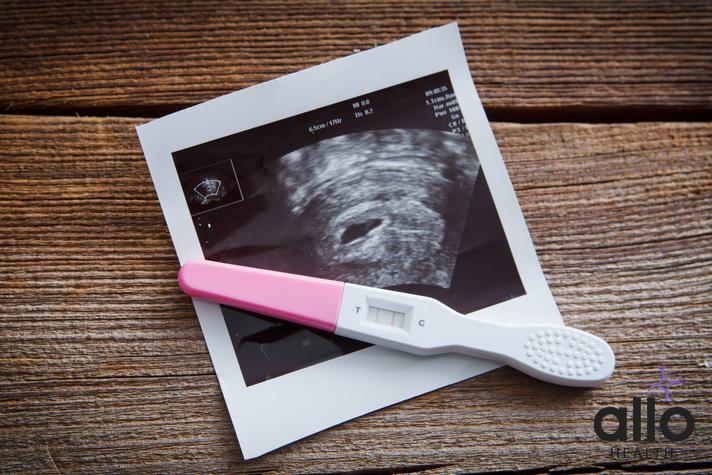Impact Of Rough Sex During Pregnancy

Allo Health is dedicated to personalized well-being, offering support and trusted information tailored to individual health goals. The platform emphasizes human-generated content, led by a distinguished medical team of experts, including physicians and sexual health specialists. Their commitment to credibility involves rigorous fact-checking, authoritative research, and continuous updates to ensure accurate, up-to-date information. Allo Health's unique approach goes beyond conventional platforms, providing expert-led insights and a continuous commitment to excellence, with user feedback playing a crucial role in shaping the platform's authoritative voice.

Dr Sanina Mansoor holds MBBS degree from Yenepoya university,Mangalore.She has 8 years of experience working as a medical officer at various health centres and medical colleges.
Why This Was Upated?
Our experts continually monitor the health and wellness space, and we update our articles when new information became available.
Updated on 27 May, 2024
- Article was updated as part of our commitment to diversity, equity, and inclusion.

"The following blog article provides general information and insights on various topics. However, it is important to note that the information presented is not intended as professional advice in any specific field or area. The content of this blog is for general educational and informational purposes only.
Book consultation
The content should not be interpreted as endorsement, recommendation, or guarantee of any product, service, or information mentioned. Readers are solely responsible for the decisions and actions they take based on the information provided in this blog. It is essential to exercise individual judgment, critical thinking, and personal responsibility when applying or implementing any information or suggestions discussed in the blog."
Exploring the impact of rough sex during pregnancy is crucial for understanding potential risks and benefits. While sexual activity is generally considered safe during pregnancy, the intensity and nature of activities raise questions about maternal and fetal well-being. This examination delves into medical perspectives, addressing concerns and offering insights to help expectant couples make informed decisions regarding their sexual health during this delicate period.
The Risks of Rough Sex During Pregnancy
- Increased risk of injury: Rough sex may lead to physical trauma, causing harm to the pregnant woman or the developing fetus.
- Placental abruption: Forceful activities may result in the separation of the placenta from the uterine wall, jeopardizing the baby’s oxygen and nutrient supply.
- Preterm labor: Intense stimulation could potentially trigger contractions and premature labor.
- Infection risk: Open wounds or tears from rough sex may increase the risk of infection, posing a threat to both the mother and the baby.
- Consultation is crucial: Pregnant individuals should always consult with their healthcare provider before engaging in any sexual activity to ensure the safety of both the mother and the unborn child.
Understanding the Physical Changes During Pregnancy
- Weight Gain: Normal weight gain is around 25-35 pounds.
- Enlarged Uterus: Grows from the size of a pear to a watermelon.
- Hormonal Changes: Increased levels of hormones like estrogen and progesterone.
- Breast Changes: Enlargement and increased sensitivity.
- Cardiovascular Changes: Blood volume and heart rate increase.
- Digestive System Changes: Slowed digestion and increased nutrient absorption.
- Respiratory Changes: Increased oxygen consumption.
- Urinary Changes: Increased frequency due to pressure on the bladder.
- Musculoskeletal Changes: Shift in the center of gravity, joint looseness.
- Skin Changes: Stretch marks, pigmentation changes, and increased oiliness.
- Hair and Nail Changes: Increased growth and thickness.
- Immune System Changes: Altered to protect the developing fetus.
- Fluid Retention: Swelling in hands and feet.
- Placental Development: Provides nutrients and oxygen to the baby.
- Increased Blood Flow: Supplies nutrients and oxygen to the developing baby.
- Organ Displacement: Organs shift to accommodate the growing uterus.
- Cervical Changes: Softening and dilation in preparation for childbirth.
- Vaginal Changes: Increased blood flow and secretions.
Understanding these changes helps ensure a healthy pregnancy and delivery.
How Does Rough Sex Affect Your Unborn Baby?

Rough sex, especially in the third trimester of pregnancy, can have serious consequences for your unborn child. Excessive pressure on the abdomen or rough contact can cause the baby to be dislodged from its position in the uterus, which can lead to birth defects or even miscarriage.
In addition, rough sex during pregnancy may make it more difficult for the mother to deliver the baby vaginally, increasing the risk of cesarean delivery.
It is important for pregnant women to communicate with their partners about their comfort levels and to avoid any sexual activities that may cause discomfort or harm to the baby. This may include avoiding certain positions or activities that involve excessive pressure on the abdomen.
It is also recommended that pregnant women consult with their healthcare provider about their sexual activity during pregnancy and any concerns they may have. Your healthcare provider can guide safe sexual practices during pregnancy and help address any concerns you may have.
Tips for Safe and Comfortable Sex During Pregnancy
- Communicate openly with your partner and healthcare provider about concerns and preferences.
- Choose comfortable positions that avoid putting pressure on the abdomen.
- Use plenty of lubrication to enhance comfort and reduce friction.
- Experiment with different positions to find what feels best for both partners.
- Take it slow and listen to your body; stop if you experience any discomfort.
- Opt for side-by-side or spooning positions to minimize strain on the back and pelvis.
- Consider using supportive pillows for added comfort and better alignment.
- Regularly engage in open communication about desires, fears, and any changes in libido.
- Ensure regular prenatal check-ups to address any health concerns or complications.
- Consult with a healthcare professional if there are specific concerns or complications during pregnancy.
Common Misconceptions About Sex and Pregnancy
- Conception Timing: Believing you can only conceive during ovulation is a misconception; sperm can live in the female reproductive tract for several days.
- Safe Periods: Assuming certain times are completely safe for unprotected sex ignores the variability in menstrual cycles and the possibility of early or late ovulation (may include chances of heavy bleeding).
- Fertility Posture: Thinking certain sexual positions enhance or reduce fertility lacks scientific basis; conception depends more on sperm reaching the egg.
- Men’s Age: Overlooking the impact of age on male fertility is a misconception; advanced paternal age can also affect the chances of conception and the health of the child.
- Instant Pregnancy: Expecting instant results from unprotected intercourse leads to unnecessary stress; conception often takes time, even for healthy couples.
- Miscarriage Blame: Incorrectly attributing miscarriages solely to the woman’s actions or lifestyle neglects the various factors contributing to pregnancy loss.
- Breastfeeding as Contraception: Assuming exclusive breastfeeding is foolproof contraception can lead to unintended pregnancies; fertility can return before the resumption of regular menstrual cycles (with mild cramping sometimes).
- Age and Fertility: Believing infertility concerns only arise in older women neglects the fact that fertility can be compromised in both men and women at various ages.
- Contraception Myths: Relying on common myths about contraception methods, such as douching or urinating after sex, can lead to unintended pregnancies.
- Pregnancy Signs: Misinterpreting common symptoms like a missed period or nausea as sure signs of pregnancy can result in false alarms; many factors can cause similar symptoms.
Talking to Your Partner About Your Sexual Needs During Pregnancy

For many couples, pregnancy can be a time of heightened emotional and physical intimacy. However, it’s important to remember that every woman’s experience of pregnancy is different, and what feels comfortable and enjoyable to one partner may not feel the same to the other. Couples should communicate openly and honestly about their sexual needs, concerns, and limitations during pregnancy.
It’s also important to remember that pregnancy can be a time of great physical and emotional vulnerability, and women may experience mood swings, fatigue, and discomfort that can affect their desire for sex. Couples should be patient and supportive of each other and prioritize their emotional connection and physical intimacy.
Another important aspect to consider is the potential risks associated with certain sexual activities during pregnancy. Couples should consult with their healthcare provider to determine what is safe and what should be avoided. It’s also important to use appropriate protection to prevent sexually transmitted infections, which can be harmful to both the mother and the baby.
Finally, it’s important to recognize that sexual intimacy during pregnancy can be a positive and enjoyable experience for many couples. It can help to strengthen the emotional bond between partners and provide a sense of closeness during a time of significant change. By communicating openly and honestly, and prioritizing each other’s needs and comfort, couples can navigate this exciting and challenging time together.
When to Avoid Sex During Pregnancy
- High-Risk Pregnancy: If your pregnancy is considered high-risk, consult your healthcare provider before engaging in sexual activity.
- Vaginal Bleeding: If you experience vaginal bleeding, avoid sex and notify your healthcare provider immediately.
- Placenta Concerns: Conditions like placenta previa or placental abruption may necessitate avoiding sex. Consult your healthcare provider for guidance.
- Preterm Labor History: If you have a history of preterm labor or are at risk for it, your healthcare provider may advise against sexual activity.
- Ruptured Membranes: If your water has broken, avoid sex to reduce the risk of infection. Seek medical attention promptly.
- Cervical Incompetence: If you’ve been diagnosed with cervical incompetence, your healthcare provider may recommend abstaining from sex during pregnancy.
- Infections or STDs: If you or your partner has an infection or sexually transmitted disease, it’s crucial to abstain from sex or use protection to prevent complications.
- Uncomfortable or Painful Sex: If sex becomes uncomfortable or causes pain, it’s essential to communicate with your partner and consider alternative forms of intimacy.
- Medical Advice: Always consult your healthcare provider before making decisions about sexual activity during pregnancy, as individual circumstances vary.
How to Recognize Signs of Complications After Rough Sex During Pregnancy
If you do experience discomfort or pain after having sex during pregnancy, it’s important to pay attention to your body and seek medical attention if necessary. Common signs of complications after rough sex during pregnancy include vaginal bleeding, abdominal cramping, or contractions. If you experience any of these symptoms, contact your doctor immediately.
It’s also important to note that some women may experience emotional distress after engaging in rough sex during pregnancy. This can include feelings of guilt, shame, or anxiety. It’s important to communicate with your partner and seek support from a healthcare provider or therapist. Remember, it’s okay to prioritize your physical and emotional well-being during pregnancy.
Seeking Help and Support for Sexual Concerns During Pregnancy

- Open communication: Discuss concerns with your partner openly.
- Professional guidance: Consult a healthcare provider for advice.
- Emotional support: Seek understanding from friends and family.
- Counseling options: Explore therapy to address emotional aspects.
- Education: Learn about changes during pregnancy for better understanding.
- Online resources: Utilize reputable websites for information.
- Support groups: Join communities for shared experiences.
- Couple’s counseling: Consider sessions to strengthen the relationship.
- Self-care: Prioritize mental and emotional well-being.
- Normalize seeking help: Recognize it as a common aspect of pregnancy.
Alternative Ways to Maintain Intimacy During Pregnancy

- Communicate openly: Share feelings, concerns, and desires with your partner.
- Explore non-sexual intimacy: Focus on emotional connection through cuddling, hand-holding, and meaningful conversations.
- Try new activities together: Engage in hobbies or activities that strengthen your bond.
- Prioritize quality time: Set aside dedicated time for each other amidst busy schedules.
- Be creative in the bedroom: Experiment with different forms of physical intimacy that are comfortable during pregnancy.
- Attend prenatal classes together: Strengthen your connection by learning and preparing for parenthood as a team.
- Seek professional guidance: Consult a healthcare provider or counselor for advice on maintaining intimacy during pregnancy.
- Focus on mutual support: Show understanding and support each other’s physical and emotional changes.
- Embrace changes: Acknowledge and adapt to the changes in the relationship dynamics during pregnancy.
The Importance of Regular Prenatal Checkups for Safe and Healthy Pregnancy
- Early Detection: Identifying and addressing potential concerns early in pregnancy.
- Fetal Monitoring: Regular checkups track the baby’s growth, heartbeat, and overall development.
- Maternal Health: Monitoring the mother’s health ensures a safe environment for the baby.
- Risk Assessment: Identifying and managing potential complications and reducing risks.
- Nutritional Guidance: Ensuring proper nutrition for both mother and baby.
- Blood Pressure Monitoring: Critical for detecting and managing conditions like preeclampsia.
- Screening for Infections: Preventing and treating infections that could harm the baby.
- Emotional Support: Addressing emotional and mental well-being during this transformative period.
- Educational Opportunities: Providing information on childbirth, breastfeeding, and postpartum care.
- Customized Care: Tailoring advice and interventions based on the individual needs of the pregnant woman.
- Enhanced Pregnancy Experience: A proactive approach for a healthier, less stressful pregnancy.
Most Asked Questions
-
Is Rough Sex Safe During Pregnancy?
While mild to moderate activity is generally safe, consult your healthcare provider to ensure it won't harm the baby or jeopardize your health.
-
Can Rough Sex Cause Preterm Labor?
Intense activities may stimulate contractions, but it's crucial to distinguish between normal sexual activity and actions that pose a risk. Consult your doctor.
-
Are Certain Positions Safer During Pregnancy?
Opt for positions that avoid pressure on the abdomen and provide comfort. Your healthcare provider can offer guidance on safe and enjoyable positions.
-
What if Spotting Occurs After Rough Sex?
Light spotting may be normal, but persistent or heavy bleeding is a concern. Contact your healthcare provider immediately if you experience bleeding after intercourse.
-
How Does Rough Sex Affect the Baby?
In most cases, the baby is well-protected by the amniotic fluid and the cervix. However, consult your healthcare provider to assess any potential risks associated with specific activities.






































